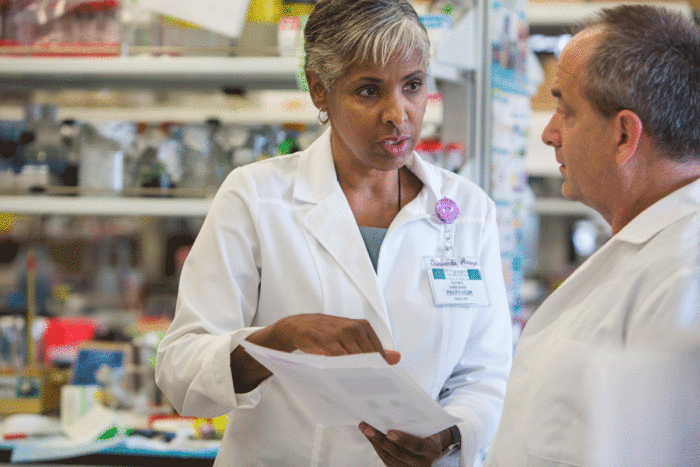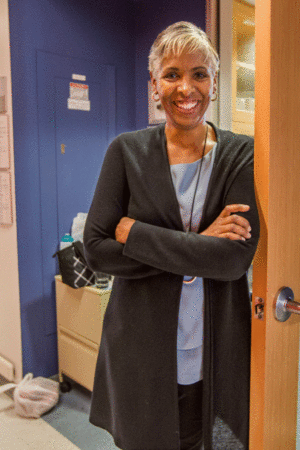Washington People: Sarah England
Noted researcher encourages tenacity and tackling new challenges
 Karen Elshout
Karen ElshoutSarah England, PhD, talks to staff scientist Ronald McCarthy in her lab in the BJC Institute of Health at Washington University School of Medicine in St. Louis.
In 2005, Sarah England took a break from her job as a scientist at the University of Iowa to work as a health policy fellow in U.S. Sen. Hillary Clinton’s office on Capitol Hill. She helped draft legislation on newborn screenings, preterm birth research and other issues related to the health of mothers and babies during pregnancy.
England, who has a doctorate in physiology, said it was a remarkable experience and a defining year for her. “I liked being able to link policy to the basic science that we do every day,” said England, the Alan A. and Edith L. Wolff Professor of Medicine in Obstetrics and Gynecology at Washington University School of Medicine in St. Louis. “Also, I was used to being around really smart academicians. It was nice to be around incredibly smart people in a different realm and interact with people who think on a broader scale.”
The experience affirmed her belief in being fearless and tackling new things, which she tries to teach the people in her lab. It also is important to her to instill confidence in the people who work with her and to teach them that they will face challenges but they must bounce back.
One of her lab members took her messages to heart. She gave England a toy giraffe to thank her for teaching her to stand tall. The giraffe now graces a windowsill in England’s office.
 Karen Elshout
Karen Elshout“I think I get my resilience from my father and my feistiness from my mother, who is a strong person,” said England, the youngest of five kids in her family and the only girl. “Growing up with all of those brothers was a little crazy, but I think I was the one in charge.”
Although she might have bossed her brothers around a bit, today England has a reputation as an exceptional leader and researcher who is enthusiastic, supportive and driven. She heads a basic science program with the goal of understanding how ion channels — which she describes as roads through the membrane of a cell — work in blood vessels and in the muscle layer of the uterus, and whether movement of ions through these roads hampers contractions during pregnancy and labor.
Her work one day could reduce the frequency of preterm labor, which affects 12 percent of births in the United States and is the leading cause of newborn death. Babies who survive often have serious and lifelong health challenges, including breathing problems, developmental delays, vision loss and cerebral palsy.
“The roads sometimes are closed, and the roads sometimes are open,” England said. “We need for the roads to be open at specific times for the uterus to contract. If the road is closed, the whole system falls apart and can lead to arrhythmia of the uterus. We think this is related to preterm birth.”
She and her team are trying to find how ion channels are regulated in the uterus, in order to target these channels with medication or other interventions aimed at reducing the frequency of preterm births.
Celia Santi, MD, PhD, an associate professor of obstetrics and gynecology at the School of Medicine, is working on a study with England to understand the molecular roots of preterm birth. Santi calls England a pioneer in her field and an extremely resourceful scientist. “Premature labor is a major factor in early infant death, and Dr. England’s research on ion channels has opened a new window into understanding why it happens and developing new treatments to prevent uterine contractions,” she said. “And as a colleague, she is fantastic. She is sincere, supportive and always gives great advice.”
England is an associate director at the university’s Center for Reproductive Health Sciences, an associate program director of the March of Dimes Prematurity Research Center at the School of Medicine, and leads a clinical study that is investigating whether disruptions in circadian rhythm increase the risk of a woman delivering a baby early. Some of these disruptions include working at night, eating erratically and sleeping too little. Previous studies have shown that women who are shift workers are more likely to have erratic periods and deliver babies prematurely.
George Macones, MD, the Mitchell and Elaine Yanow Professor and head of Obstetrics and Gynecology, said the university community is very fortunate to have England. “Sarah is a phenomenal scientist, mentor and colleague,” he said. “In addition to the great research contributions she has made to our field, she spends many hours guiding and helping trainees in her own lab and junior faculty in our division.”
Choosing research
England joined Washington University in 2011 after spending 14 years at the University of Iowa.
 Courtesy of Sarah England
Courtesy of Sarah EnglandShe earned a bachelor’s degree in biology at Carleton College in Northfield, Minn., and a doctorate in physiology from the Medical College of Wisconsin before completing a postdoctoral fellowship in molecular physiology and biophysics at Vanderbilt University.
England grew up in the Highland Park neighborhood of St. Paul, Minn., where her family moved in 1969 to attend better schools after passage of the Fair Housing Act, which protects buyers and renters from seller or landlord discrimination. Her dad, an internist, and her mother, a homemaker who also worked in real estate, stressed the importance of education. They made sure their family had breakfast and dinner together, even if her father worked late. She and her brothers were told to behave as if they were eating in front of the queen of England.
She was fascinated by science from a young age. When it came time to choose a career, one of her brothers who is a physician advised England to become a researcher instead of a doctor. “He said he thought I would like the excitement of discovery because I am naturally competitive and like to know things first,” she said. “I think he was right.”
She was a distance runner for years and has competed in marathons. In her free time, she regularly plays tennis and is on a local U.S. Tennis Association team. A job she might consider, she said, is carrying Serena Williams’ tennis bag.
England also is a dog lover and currently spoils a German shepherd and a cocker spaniel.
Mala Mahendroo, PhD, a professor of obstetrics and gynecology at University of Texas Southwestern Medical Center and a professional colleague of England’s, said her passion about science and many other subjects is infectious to those around England. “Having traveled with Dr. England on a visiting professorship to several research institutions in China, I can attest to the fact that she brings as much enthusiasm to hiking on the Great Wall of China as she does to any scientific discussion she may participate in,” she said.
 Courtesy of Sarah England
Courtesy of Sarah England





